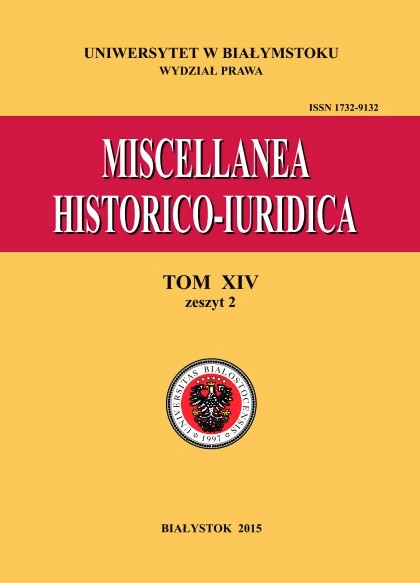Ministry of Justice Against Self-governing Demands of the Judges in the Years 1980–1981
Keywords:
judges, judiciary, self-government, Ministry of Justice, “Solidarity” Trade UnionAbstract
The judiciary in the Polish People’s Republic was not a separate, self-governing sphere of power. The judiciary was under the supervision of the Polish United Workers Party (PZPR) and the Ministry of Justice. Political and executive authorities decided upon the staffing and professional matters of judges. In autumn 1980, on the basis of the August Agreements, independent trade unions of judiciary workers were formed in the courts. Judges, associated in them, put forward their own demands and thanks to the strength of trade unions they exerted pressure on the Minister of Justice seeking chances to push through systemic changes, which would guarantee independence and self-governance of the judiciary. Implementation of the judges demands would deprive the PZPR and the Ministry of Justice of the ability to govern in the sphere of justice. The authorities did not intend to resign from these prerogatives. But the Ministry of Justice, devoid of PZPR political support, gradually gave way to the judges demands. As a result of ongoing discussion in the Ministry of Justice in the years 1980–1981, two concepts of self-governance of the judiciary were created: the judges concept of decision-making self-governance and the ministerial concept of quasi self-governance with consultative prerogatives. They were reflected in multi-variant draft amendment to the law on common courts, prepared by the Ministry of Justice in November 1981. The ministerial concept became the basis of subsequent changes made in the reform of the judiciary, performed under the dictation of the PZPR in 1984–1985. Concepts from the years 1980–1981 evolved and became the basis for the reform of the judiciary system in the systemic transition period in 1989. In great measure, self-governance of the judges functions to this day on the basis of the solutions developed in 1980–1981.
References
Berutowicz W., Mokry J., Organizacja ochrony prawnej w PRL, Warszawa 1987.
Garlicki L., Zasady ustroju sądów w PRL (na tle rozwiązań ustawy z 20 czerwca 1985 r. – Prawo o ustroju sądów powszechnych), „Nowe Prawo” 1987, nr 7–8.
Kauba K. ,„Solidarność” w resorcie sprawiedliwości, „Tygodnik Solidarność” 1981, nr 24.
Machcewicz K., Samorząd sędziowski, „Tygodnik Solidarność” 1981, nr 36.
Obywatelskie Centrum Inicjatyw Ustawodawczych Solidarności 1980–1990, oprac. K. Barczyk, S. Grodziski, S. Grzybowski, Warszawa 2001.
Pomian G., Polska „Solidarności”, Paryż 1982.
Problemów jest mnóstwo – rozmowa z członkami Krajowej Komisji Koordynacyjnej NSZZ „Solidarność” Pracowników Wymiaru Sprawiedliwości, „Gazeta Prawnicza” 1981, nr 9.
Rudnicki S., O praworządności i niepraworządności w wymiarze sprawiedliwości, „Tygodnik Powszechny” 1981, nr 24.
Rzepliński A., Sądownictwo w PRL, Londyn 1990.
Sąd Najwyższy w PRL, red. M. Rybicki, Wrocław 1983.
„Solidarność” pracowników wymiaru sprawiedliwości – rozmowa Jolanty Strzeleckiej z sędzią Adamem Strzemboszem, „Tygodnik Solidarność” 1981, nr 10.
Stanowska M., Strzembosz A., Sędziowie warszawscy w czasie próby 1981–1988, Warszawa 2005.
Strzembosz A., O samorządne sądownictwo w samorządnej Rzeczypospolitej, „Tygodnik Solidarność” 1981, nr 33.
Strzembosz A., „Solidarność” o prawie i praworządności, „Gazeta Prawnicza” 1981, nr 15–16.
Szarycz J., Sędziowie i sądy w Polsce w latach 1918–1988, Warszawa 1988.
Ślężak J., Dlaczego polskie sądownictwo powinno być samorządne?, „Tygodnik Solidarność” 1981, nr 11.
Ustrój sądów, oprac. J. Szarycz, Warszawa 1989.
Walczak R., Polityka, sądy, prokuratura, Warszawa 1990.
Walczak R., Sprawowanie kierowniczej roli partii w sądach i prokuraturze w Polsce Ludowej (studium politologiczne), Warszawa 1987.
Włodyka S., Organizacja wymiaru sprawiedliwości w PRL, Warszawa 1963.
Wreszcie partner – rozmowa z przedstawicielami NSZZ Pracowników Wymiaru Sprawiedliwości, „Gazeta Prawnicza” 1981, nr 7–8.







